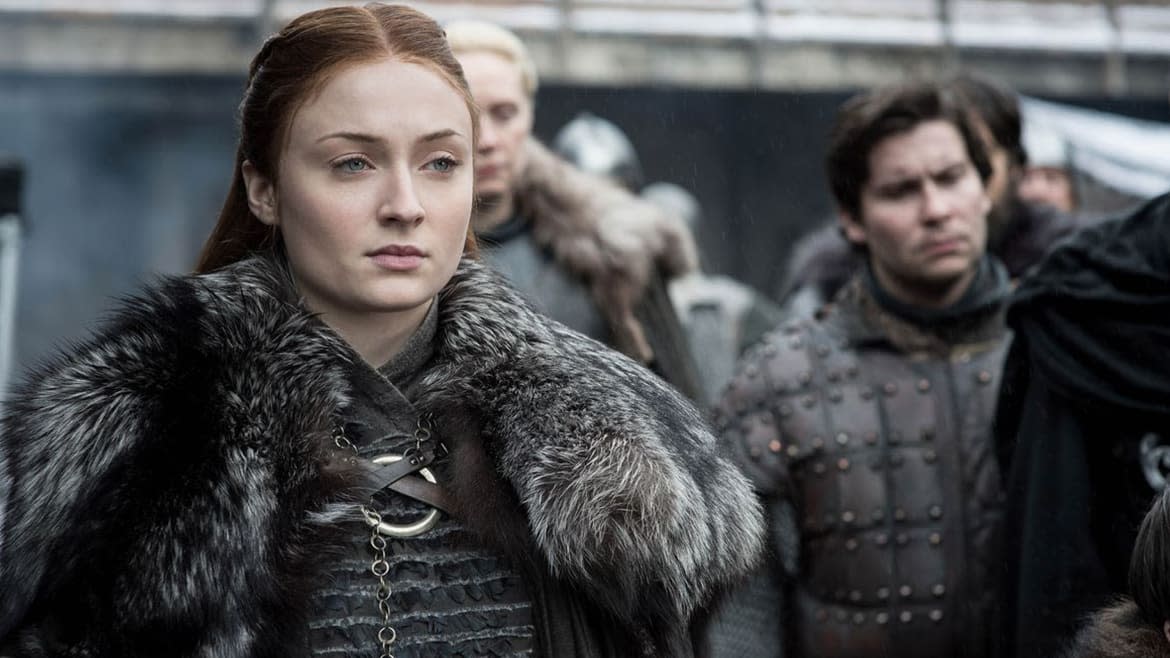How Sansa Stark Became the Savviest Person in Westeros

On a show where dragons take down armies and ice zombies threaten humanity, it’s easy for the emotional maturing of a naive young girl to fly under the radar. But in Season 8, Game of Thrones finally seems ready to acknowledge what we’ve already seen: Sansa Stark is the cleverest player of the game, its most cunning politician, and a leader whose instincts and judgment are invaluable. She is not a conqueror, a warrior, or a queen, but she is a survivor—and if the living intend to stay that way, they should look to the Lady of Winterfell.
Sansa’s arc for so long involved victimization at the hands of tyrants and megalomaniacs who dismissed her potential because of her girlishness. While her siblings became warriors, led wars, or adventured north of the Wall, Sansa was trapped in the homes of her family’s enemies. This necessarily made her journey a subtler, more internal transformation, and one of the show’s most fascinating; it’s what we glimpse through gritted teeth as she learns to let enemies hear what they want to hear, to reflect what they want to see.
It’s why she’s proven unpopular with fans who mistakenly insist she doesn’t “do” anything, just because she doesn’t swing swords or swap faces or enter the minds giants. It’s exactly because of how easy she is to underestimate that Sansa survived for so long under her enemies’ noses. It’s how she learned to understand their thinking, what information to withhold, and how to make the most of dire situations—it’s how she learned politics.
It was gratifying then, to hear Arya Stark inform Jon Snow in the first episode of Season 8 that Sansa is “the smartest person I’ve ever met,” fizzling his attempt to bond through mutual eye-rolling at their sister. Not for the first time, Tyrion—whom she left to take the fall after Joffrey’s death at the purple wedding—expresses respect for Sansa’s instincts, too: “Many underestimated you. Most of them are dead now,” he tells her. More importantly, Sansa asserts her own growth from a naive girl blinded by fairy tales to a sharp leader who can see through a lie even Tyrion can’t: “I used to think you were the cleverest man in the world,” she tells him, in a crushing expression of disappointment.
Sansa has risen from a horrific past to the position of Lady of Winterfell, and cuts a taller, more regal figure onscreen these days than she did in King’s Landing. But more than any survivor on the show, Sansa’s life has depended on making sure that enemies underestimated her. She had to convince Cersei Lannister, Joffrey, and Ramsay Bolton that she was useful yet harmless enough to keep alive—for years at a time, in a delicate balancing act that the more impulsive Starks, like Arya or Jon Snow, likely would fail.
Some attribute her savviness to the time she spent up-close with master manipulators Cersei and Littlefinger, but Sansa has played the game almost instinctively from the start, always with her cards pressed close to her chest. Think of how she flattered her tormentor, Joffrey, and negotiated for her father’s life (and succeeded until the last second when Joffrey broke his word on a whim). How deftly she made sure never to give Cersei reason to suspect her or discard her. How she refused, even two seasons later, to confess a single honest opinion about Joffrey to Olenna Tyrell, whom she had just met. Sansa’s commitment to staying alive is tougher than Valyrian steel.
She’s certainly got the best poker face, a calculating mind, and superhuman resilience. And she hasn’t let herself forget the “lessons” her enemies taught her—she can never afford to. Too much depends on how well she turns intimate knowledge about those foes to her advantage. She knew Littlefinger, for instance, would be good on his word to deliver the Knights of the Vale and help win the Battle of the Bastards. Just like she knows that Cersei, whatever Tyrion was tricked into believing, would never lift a finger to help the North.
Her gift for strategy has proved difficult for the show to illustrate coherently in its latter seasons—which is a shame since that’s when Sansa’s arc began to pay off most dramatically. Her last-minute entrance in the battle against Ramsay should have been a triumph; instead, the moment was nearly overshadowed by confusion. (Why hadn’t she told Jon reinforcements might be on the way? The show never answered.) Her feud with Arya last season felt similarly contrived. We’re to believe that the sisters bonded offscreen and laid a trap for Littlefinger. But that was so unclear in the plot’s rushed execution that instead it read like both sisters suffered short bouts of psychosis then snapped out of it when no one was looking.
Still, Season 8 begins with loud and clear recognition of Sansa’s abilities. And it hints that her mistrust of Daenerys isn’t exactly unjustified. (Sansa’s loyalty has always been with the North and her family; Daenerys, meanwhile, wants a throne; she expects subservience, not a relationship between equals.) The show’s handling of female conflict still lands awkwardly—the two are reduced to passive-aggressive sniping and long, petty glares across a table. But by this point, we know we shouldn’t dismiss Sansa’s instincts or her intelligence. It’s about time she gets some recognition—a little more respect would be nice, too.

